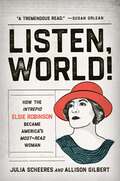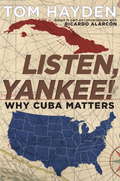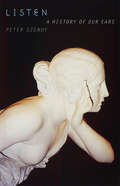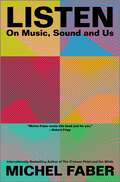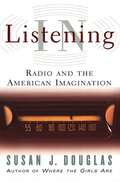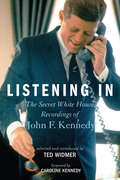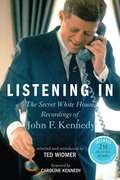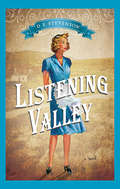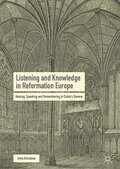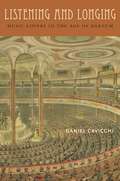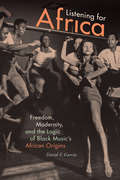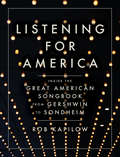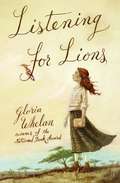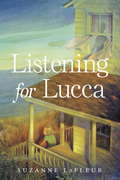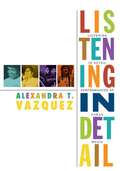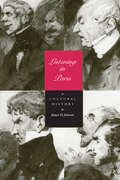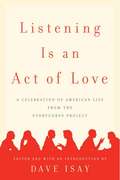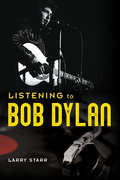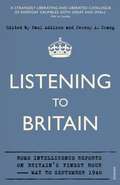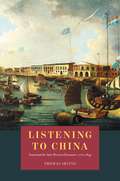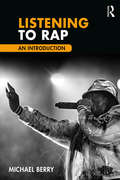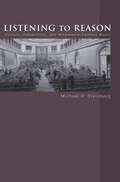- Table View
- List View
Listen, Vienna: The Life of St. Clement Mary Hofbauer
by James J. GalvinIn many ways this book gives an old history of Germany, France,and Russia during the 18th century. It is a story of deep commitment, lasting faith, and the resilience of the spirit in times of great oppression.
Listen, World!: How the Intrepid Elsie Robinson Became America's Most-Read Woman
by Julia Scheeres Allison Gilbert*Winner of the 2023 Northern California Book Award* The first biography of Elsie Robinson, the most influential newspaper columnist you&’ve never heard of At thirty-five, Elsie Robinson feared she&’d lost it all. Reeling from a scandalous divorce in 1917, she had no means to support herself and her chronically ill son. She dreamed of becoming a writer and was willing to sacrifice everything for this goal, even swinging a pickax in a gold mine to pay the bills. When the mine shut down, she moved to the Bay Area. Armed with moxie and samples of her work, she barged into the offices of the Oakland Tribune and was hired on the spot. She went on to become a nationally syndicated columnist and household name whose column ran for over thirty years and garnered more than twenty million readers. Told in cinematic detail by bestselling author Julia Scheeres and award-winning journalist Allison Gilbert, Listen, World! is the inspiring story of a timeless maverick, capturing what it means to take a gamble on self-fulfillment and find freedom along the way.
Listen, Yankee!
by Tom HaydenBased on unprecedented access to both Cuban and American officials, a book that offers fresh insight into one of history's most enigmatic relationships between nation-states--from one of America's best-known voices of political and social activism.Listen, Yankee! offers an account of Cuban politics from Tom Hayden's unique position as an observer of Cuba and as a US revolutionary student leader whose efforts to mobilize political change in the US mirrored the radical transformation simultaneously going on in Cuba.Chapters are devoted to the writings of Che Guevara, Régis Debray, and C. Wright Mills; the Cuban missile crisis; the Weather Underground; the assassination of JFK; the strong historical links between Cuba and Africa; the Carter era; the Clinton era; the Cuban Five; Elián González; and the December 17, 2014 declaration of normalization by presidents Obama and Castro.Hayden puts the present moment into historical context, and shows how we're finally finding common ground to the advantage of Cubans and Americans alike. From the Hardcover edition.
Listen: A History of Our Ears
by Charlotte Mandell Jean-Luc Nancy Peter SzendyIn this intimate meditation on listening, Peter Szendy examines what the role of the listener is, and has been, through the centuries. The role of the composer is clear, as is the role of the musician, but where exactly does the listener stand in relation to the music s/he listens to? What is the responsibility of the listener? Does a listener have any rights, as the author and composer have copyright? Szendy explains his love of musical arrangement (since arrangements allow him to listen to someone listening to music), and wonders whether it is possible in other ways to convey to others how we ourselves listen to music. How can we share our actual hearing with others? Along the way, he examines the evolution of copyright laws as applied to musical works and takes us into the courtroom to examine different debates on what we are and aren’t allowed to listen to, and to witness the fine line between musical borrowing and outright plagiarism. Finally, he examines the recent phenomenon of DJs and digital compilations, and wonders how technology has affected our habits of listening and has changed listening from a passive exercise to an active one, whereby one can jump from track to track or play only selected pieces.
Listen: On Music, Sound and Us
by Michel Faber"I'm not here to change your mind about Dusty Springfield or Shostakovich or Tupac Shakur or synthpop. I'm here to change your mind about your mind." There are countless books on music with much analysis given to musicians, bands, eras and/or genres. But rarely does a book delve into what's going on inside us when we listen.Michel Faber explores two big questions: how do we listen to music and why do we listen to music? To answer these questions, he considers a range of factors, which includes age, illness, the notion of "cool," commerce, the dichotomy between "good" and "bad" taste and much more. From the award-winning author of The Crimson Petal and the White and Under the Skin, this idiosyncratic and philosophical book reflects Michel Faber's lifelong obsession with music of all kinds. Listen will change your relationship with the heard world.
Listening In: Radio and the American Imagination
by Susan J. DouglasFew inventions evoke such nostalgia, such deeply personal and vivid memories as radio—from Amos &’n&’ Andy and Edward R. Murrow to Wolfman Jack and Howard Stern. Listening In is the first in-depth history of how radio culture and content have kneaded and expanded the American psyche.But Listening In is more than a history. It is also a reconsideration of what listening to radio has done to American culture in the twentieth century and how it has brought a completely new auditory dimension to our lives. Susan Douglas explores how listening has altered our day-to-day experiences and our own generational identities, cultivating different modes of listening in different eras; how radio has shaped our views of race, gender roles, ethnic barriers, family dynamics, leadership, and the generation gap. With her trademark wit, Douglas has created an eminently readable cultural history of radio.
Listening In: The Secret White House Recordings of John F. Kennedy
by Caroline Kennedy Ted WidmerIn July 1962, in an effort to preserve an accurate record of Presidential decision-making in a highly charged atmosphere of conflicting viewpoints, strategies and tactics, John F. Kennedy installed hidden recording systems in the Oval Office and in the Cabinet Room. The result is a priceless historical archive comprising some 265 hours of taped material. JFK was elected president when Civil Rights tensions were near the boiling point, and Americans feared a nuclear war. Confronted with complex dilemmas necessitating swift and unprecedented action, President Kennedy engaged in intense discussion and debate with his cabinet members and other advisors. Now, in conjunction with the fiftieth anniversary of the Kennedy presidency, the John F. Kennedy Library and historian Ted Widmer have carefully selected the most compelling and important of these remarkable recordings for release, fully restored and re-mastered onto two 75-minute CDs for the first time. Listening In represents a uniquely unscripted, insider account of a president and his cabinet grappling with the day-to-day business of the White House and guiding the nation through a hazardous era of uncertainty.Accompanied by extensively annotated transcripts of the recordings, and with a foreword by Caroline Kennedy, Listening In delivers the story behind the story in the unguarded words and voices of the decision-makers themselves. Listening In covers watershed events, including the Cuban Missile Crisis, the Space Race, Vietnam, and the arms race, and offers fascinating glimpses into the intellectual methodology of a circumspect president and his brilliant, eclectic brain trust. Just as the unique vision of President John F. Kennedy continues to resonate half a century after his stirring speeches and bold policy decisions, the documentary candor of Listening In imparts a vivid, breathtaking immediacy that will significantly expand our understanding of his time in office.
Listening In: The Secret White House Recordings of John F. Kennedy
by Ted WidmerIn July 1962, in an effort to preserve an accurate record of Presidential decision-making in a highly charged atmosphere of conflicting viewpoints, strategies and tactics, John F. Kennedy installed hidden recording systems in the Oval Office and in the Cabinet Room. The result is a priceless historical archive comprising some 265 hours of taped material. JFK was elected president when Civil Rights tensions were near the boiling point, and Americans feared a nuclear war. Confronted with complex dilemmas necessitating swift and unprecedented action, President Kennedy engaged in intense discussion and debate with his cabinet members and other advisors. Now, in conjunction with the fiftieth anniversary of the Kennedy presidency, the John F. Kennedy Library and historian Ted Widmer have carefully selected the most compelling and important of these remarkable recordings for release, fully restored and re-mastered onto two 75-minute CDs for the first time. Listening In represents a uniquely unscripted, insider account of a president and his cabinet grappling with the day-to-day business of the White House and guiding the nation through a hazardous era of uncertainty. Accompanied by extensively annotated transcripts of the recordings, and with a foreword by Caroline Kennedy, Listening In delivers the story behind the story in the unguarded words and voices of the decision-makers themselves. Listening In covers watershed events, including the Cuban Missile Crisis, the Space Race, Vietnam, and the arms race, and offers fascinating glimpses into the intellectual methodology of a circumspect president and his brilliant, eclectic brain trust. Just as the unique vision of President John F. Kennedy continues to resonate half a century after his stirring speeches and bold policy decisions, the documentary candor of Listening In imparts a vivid, breathtaking immediacy that will significantly expand our understanding of his time in office.
Listening Valley
by D. E. StevensonNothing will stop Tonia from finding a home of her ownTonia has lived all her life in the quiet Scottish countryside and can't imagine herself anywhere else. But when her beloved older sister gets married and moves away, Tonia begins to wonder if there aren't bigger things on the horizon for her too.The advent of World War II brings Tonia briefly to the heart of London, where the roar of fighter planes echoes through the night and bombings are a constant threat--but just as she's settling into her new life, a heart-breaking tragedy sends her back home to Scotland. With new friends by her side, Tonia thinks she may have finally found the place where she is supposed to be. But the war interferes again with her plans, and she fears that the person she loves most may be lost to her forever.Readers Love D.E. Stevenson's Books:"This heartwarming novel is the literary equivalent of a comforting cup of cocoa on a cozy winter's evening--I can't recommend it highly enough."
Listening and Knowledge in Reformation Europe: Hearing, Speaking and Remembering in Calvin’s Geneva
by Anna KvicalovaThis book investigates a host of primary sources documenting the Calvinist Reformation in Geneva, exploring the history and epistemology of religious listening at the crossroads of sensory anthropology and religion, knowledge, and media. It reconstructs the social, religious, and material relations at the heart of the Genevan Reformation by examining various facets of the city’s auditory culture which was marked by a gradual fashioning of new techniques of listening, speaking, and remembering. Anna Kvicalova analyzes the performativity of sensory perception in the framework of Calvinist religious epistemology, and approaches hearing and acoustics both as tools through which the Calvinist religious identity was constructed, and as objects of knowledge and rudimentary investigation. The heightened interest in the auditory dimension of communication observed in Geneva is studied against the backdrop of contemporary knowledge about sound and hearing in a wider European context.
Listening and Longing: Music Lovers in the Age of Barnum (Music Culture)
by Daniel CavicchiListening and Longing explores the emergence of music listening in the United States, from its early stages in the antebellum era, when entrepreneurs first packaged and sold the experience of hearing musical performance, to the Gilded Age, when genteel critics began to successfully redefine the cultural value of listening to music. In a series of interconnected stories, American studies scholar Daniel Cavicchi focuses on the impact of industrialization, urbanization, and commercialization in shaping practices of music audiences in America. Grounding our contemporary culture of listening in its seminal historical moment--before the iPod, stereo system, or phonograph--Cavicchi offers a fresh understanding of the role of listening in the history of music.
Listening for Africa: Freedom, Modernity, and the Logic of Black Music's African Origins
by David F. GarcíaIn Listening for Africa David F. Garcia explores how a diverse group of musicians, dancers, academics, and activists engaged with the idea of black music and dance’s African origins between the 1930s and 1950s. Garcia examines the work of figures ranging from Melville J. Herskovits, Katherine Dunham, and Asadata Dafora to Duke Ellington, Dámaso Pérez Prado, and others who believed that linking black music and dance with Africa and nature would help realize modernity’s promises of freedom in the face of fascism and racism in Europe and the Americas, colonialism in Africa, and the nuclear threat at the start of the Cold War. In analyzing their work, Garcia traces how such attempts to link black music and dance to Africa unintentionally reinforced the binary relationships between the West and Africa, white and black, the modern and the primitive, science and magic, and rural and urban. It was, Garcia demonstrates, modernity’s determinations of unraced, heteronormative, and productive bodies, and of scientific truth that helped defer the realization of individual and political freedom in the world.
Listening for America: Inside The Great American Songbook From Gershwin To Sondheim
by Rob Kapilow“Not since the late Leonard Bernstein has classical music had a combination salesman-teacher as irresistible as Kapilow.” —Kansas City Star Few people in recent memory have dedicated themselves as devotedly to the story of twentieth- century American music as Rob Kapilow, the composer, conductor, and host of the hit NPR music radio program, What Makes It Great? Now, in Listening for America, he turns his keen ear to the Great American Songbook, bringing many of our favorite classics to life through the songs and stories of eight of the twentieth century’s most treasured American composers—Kern, Porter, Gershwin, Arlen, Berlin, Rodgers, Bernstein, and Sondheim. Hardly confi ning himself to celebrating what makes these catchy melodies so unforgettable, Kapilow delves deeply into how issues of race, immigration, sexuality, and appropriation intertwine in masterpieces like Show Boat and West Side Story. A book not just about musical theater but about America itself, Listening for America is equally for the devotee, the singer, the music student, or for anyone intrigued by how popular music has shaped the larger culture, and promises to be the ideal gift book for years to come.
Listening for God in Torah and Creation: A weekly encounter with conscience and soul
by Jonathan Wittenberg'The essence of Jewish life is not the bland performance of the Torah's commandments, but rather love of Torah and the way of life to which it is the guide.'Tap into the wisdom of one the world's ancient religions by meditating on Rabbi Wittenberg's engaging, contemporary, spiritual, social and ethical insights to the Torah. Rooted in decades of devoted immersion in Jewish learning, humanist literature, concern for people at all ages and stages of life, environmental activism and a love of nature, Rabbi Wittenberg offers wisdom relevant to Jews, Christians and spiritual seekers of all and no faiths.Over the hundred and more passages, key issues considered include: Compassion and kindness; Creation and wonder; Emotional struggles; Environment and our relationship to nature; Ethical challenges; Illness and suffering; Identity and community; Justice and Social Justice; Refugees and strangers; Remorse and repentance; Responsibility; Searching for meaning; Seeking God.
Listening for Lions
by Gloria WhelanHistorical fiction with a wicked twist. Listening for Lions is a breathtaking story of tragedy, deception, and triumph against all odds. National Book Award-winning author Gloria Whelan sets this richly historical coming-of-age adventure in British East Africa in the year 1918. This irresistible novel entangles an orphaned girl in a deceit-filled plot. Young Rachel Sheridan is made to leave her beloved Africa for England, where she must pose as the deceased daughter of a nefarious couple in an effort to gain them an enormous inheritance. Her irrepressible spirit and extraordinary wit turn her from victim to heroine in a surprising and empowering tale of a remarkable young woman.
Listening for Lucca
by Suzanne Lafleur"I'm obsessed with abandoned things." Siena's obsession began a year and a half ago, around the time her two-year-old brother Lucca stopped talking. Now Mom and Dad are moving the family from Brooklyn to Maine hoping that it will mean a whole new start for Lucca and Siena. She soon realizes that their wonderful old house on the beach holds secrets. When Siena writes in her diary with an old pen she found in her closet, the pen writes its own story, of Sarah and Joshua, a brother and sister who lived in the same house during World War II. As the two stories unfold, amazing parallels begin to appear, and Siena senses that Sarah and Joshua's story might contain the key to unlocking Lucca's voice.
Listening in Detail: Performances of Cuban Music
by Vazquez Alexandra T.Listening in Detail is an original and impassioned take on the intellectual and sensory bounty of Cuban music as it circulates between the island, the United States, and other locations. It is also a powerful critique of efforts to define "Cuban music" for ethnographic examination or market consumption. Contending that the music is not a knowable entity but a spectrum of dynamic practices that elude definition, Alexandra T. Vazquez models a new way of writing about music and the meanings assigned to it. "Listening in detail" is a method invested in opening up, rather than pinning down, experiences of Cuban music. Critiques of imperialism, nationalism, race, and gender emerge in fragments and moments, and in gestures and sounds through Vazquez's engagement with Alfredo Rodríguez's album Cuba Linda (1996), the seventy-year career of the vocalist Graciela Pérez, the signature grunt of the "Mambo King" Dámaso Pérez Prado, Cuban music documentaries of the 1960s, and late-twentieth-century concert ephemera.
Listening in Paris: A Cultural History (Studies on the History of Society and Culture #21)
by James H. JohnsonBeginning with the simple question, "Why did audiences grow silent?" Listening in Paris gives a spectator's-eye view of opera and concert life from the Old Regime to the Romantic era, describing the transformation in musical experience from social event to profound aesthetic encounter. James H. Johnson recreates the experience of audiences during these rich decades with brio and wit. Woven into the narrative is an analysis of the political, musical, and aesthetic factors that produced more engaged listening. Johnson shows the gradual pacification of audiences from loud and unruly listeners to the attentive public we know today.Drawing from a wide range of sources—novels, memoirs, police files, personal correspondence, newspaper reviews, architectural plans, and the like—Johnson brings the performances to life: the hubbub of eighteenth-century opera, the exuberance of Revolutionary audiences, Napoleon's musical authoritarianism, the bourgeoisie's polite consideration. He singles out the music of Gluck, Haydn, Rossini, and Beethoven as especially important in forging new ways of hearing. This book's theoretical edge will appeal to cultural and intellectual historians in many fields and periods.
Listening is an Act of Love: A Celebration of American Lives from the StoryCorps Project
by Dave IsaySelection of excerpts from oral history interviews from the StoryCorps Project which are also broadcast on NPR's "Morning Edition" every Friday.
Listening to Bob Dylan (Music in American Life)
by Larry StarrVenerated for his lyrics, Bob Dylan in fact is a songwriting musician with a unique mastery of merging his words with music and performance. Larry Starr cuts through pretention and myth to provide a refreshingly holistic appreciation of Dylan's music. Ranging from celebrated classics to less familiar compositions, Starr invites readers to reinvigorate their listening experiences by sharing his own—sometimes approaching a song from a fresh perspective, sometimes reeling in surprise at discoveries found in well-known favorites. Starr breaks down often-overlooked aspects of the works, from Dylan's many vocal styles to his evocative harmonica playing to his choices as a composer. The result is a guide that allows listeners to follow their own passionate love of music into hearing these songs—and personal favorites—in new ways. Reader-friendly and revealing, Listening to Bob Dylan encourages hardcore fans and Dylan-curious seekers alike to rediscover the music legend.
Listening to Britain: Home Intelligence Reports on Britain's Finest Hour, May-September 1940
by Paul Addison Jeremy A CrangFrom May to September 1940, a period that saw some of the most dramatic events in British history - including the evacuation of Dunkirk, the Battle of Britain and the opening stages of the Blitz - the Ministry of Information eavesdropped on the conversations of ordinary people in all parts of the United Kingdom and compiled secret daily reports on the state of popular morale.
Listening to China: Sound and the Sino-Western Encounter, 1770-1839 (New Material Histories of Music)
by Thomas IrvineFrom bell ringing to fireworks, gongs to cannon salutes, a dazzling variety of sounds and soundscapes marked the China encountered by the West around 1800. These sounds were gathered by diplomats, trade officials, missionaries, and other travelers and transmitted back to Europe, where they were reconstructed in the imaginations of writers, philosophers, and music historians such as Jean-Philippe Rameau, Johann Nikolaus Forkel, and Charles Burney. Thomas Irvine gathers these stories in Listening to China, exploring how the sonic encounter with China shaped perceptions of Europe’s own musical development. Through these stories, Irvine not only investigates how the Sino-Western encounter sounded, but also traces the West’s shifting response to China. As the trading relationships between China and the West broke down, travelers and music theorists abandoned the vision of shared musical approaches, focusing instead on China’s noisiness and sonic disorder and finding less to like in its music. At the same time, Irvine reconsiders the idea of a specifically Western music history, revealing that it was comparison with China, the great “other,” that helped this idea emerge. Ultimately, Irvine draws attention to the ways Western ears were implicated in the colonial and imperial project in China, as well as to China’s importance to the construction of musical knowledge during and after the European Enlightenment. Timely and original, Listening to China is a must-read for music scholars and historians of China alike.
Listening to China: Sound and the Sino-Western Encounter, 1770-1839 (New Material Histories of Music)
by Thomas IrvineFrom bell ringing to fireworks, gongs to cannon salutes, a dazzling variety of sounds and soundscapes marked the China encountered by the West around 1800. These sounds were gathered by diplomats, trade officials, missionaries, and other travelers and transmitted back to Europe, where they were reconstructed in the imaginations of writers, philosophers, and music historians such as Jean-Philippe Rameau, Johann Nikolaus Forkel, and Charles Burney. Thomas Irvine gathers these stories in Listening to China, exploring how the sonic encounter with China shaped perceptions of Europe’s own musical development. Through these stories, Irvine not only investigates how the Sino-Western encounter sounded, but also traces the West’s shifting response to China. As the trading relationships between China and the West broke down, travelers and music theorists abandoned the vision of shared musical approaches, focusing instead on China’s noisiness and sonic disorder and finding less to like in its music. At the same time, Irvine reconsiders the idea of a specifically Western music history, revealing that it was comparison with China, the great “other,” that helped this idea emerge. Ultimately, Irvine draws attention to the ways Western ears were implicated in the colonial and imperial project in China, as well as to China’s importance to the construction of musical knowledge during and after the European Enlightenment. Timely and original, Listening to China is a must-read for music scholars and historians of China alike.
Listening to Rap: An Introduction
by Michael Berry<p>Over the past four decades, rap and hip hop culture have taken a central place in popular music both in the United States and around the world. Listening to Rap: An Introduction enables students to understand the historical context, cultural impact, and unique musical characteristics of this essential genre. Each chapter explores a key topic in the study of rap music from the 1970s to today, covering themes such as race, gender, commercialization, politics, and authenticity. Synthesizing the approaches of scholars from a variety of disciplines—including music, cultural studies, African-American studies, gender studies, literary criticism, and philosophy—Listening to Rap tracks the evolution of rap and hip hop while illustrating its vast cultural significance. <p>The text features more than 60 detailed listening guides that analyze the musical elements of songs by a wide array of artists, from Afrika Bambaataa and Grandmaster Flash to Nicki Minaj, Jay-Z, Kanye West, and more. A companion website showcases playlists of the music discussed in each chapter. Rooted in the understanding that cultural context, music, and lyrics combine to shape rap’s meaning, the text assumes no prior knowledge. For students of all backgrounds, Listening to Rap offers a clear and accessible introduction to this vital and influential music.</p>
Listening to Reason: Culture, Subjectivity, and Nineteenth-Century Music
by Michael P. SteinbergThis pathbreaking work reveals the pivotal role of music--musical works and musical culture--in debates about society, self, and culture that forged European modernity through the "long nineteenth century." Michael Steinberg argues that, from the late 1700s to the early 1900s, music not only reflected but also embodied modern subjectivity as it increasingly engaged and criticized old regimes of power, belief, and representation. His purview ranges from Mozart to Mahler, and from the sacred to the secular, including opera as well as symphonic and solo instrumental music. Defining subjectivity as the experience rather than the position of the "I," Steinberg argues that music's embodiment of subjectivity involved its apparent capacity to "listen" to itself, its past, its desires. Nineteenth-century music, in particular music from a north German Protestant sphere, inspired introspection in a way that the music and art of previous periods, notably the Catholic baroque with its emphasis on the visual, did not. The book analyzes musical subjectivity initially from Mozart through Mendelssohn, then seeks it, in its central chapter, in those aspects of Wagner that contradict his own ideological imperialism, before finally uncovering its survival in the post-Wagnerian recovery from musical and other ideologies. Engagingly written yet theoretically sophisticated, Listening to Reason represents a startlingly original corrective to cultural history's long-standing inhibition to engage with music while presenting a powerful alternative vision of the modern.Some images inside the book are unavailable due to digital copyright restrictions.

